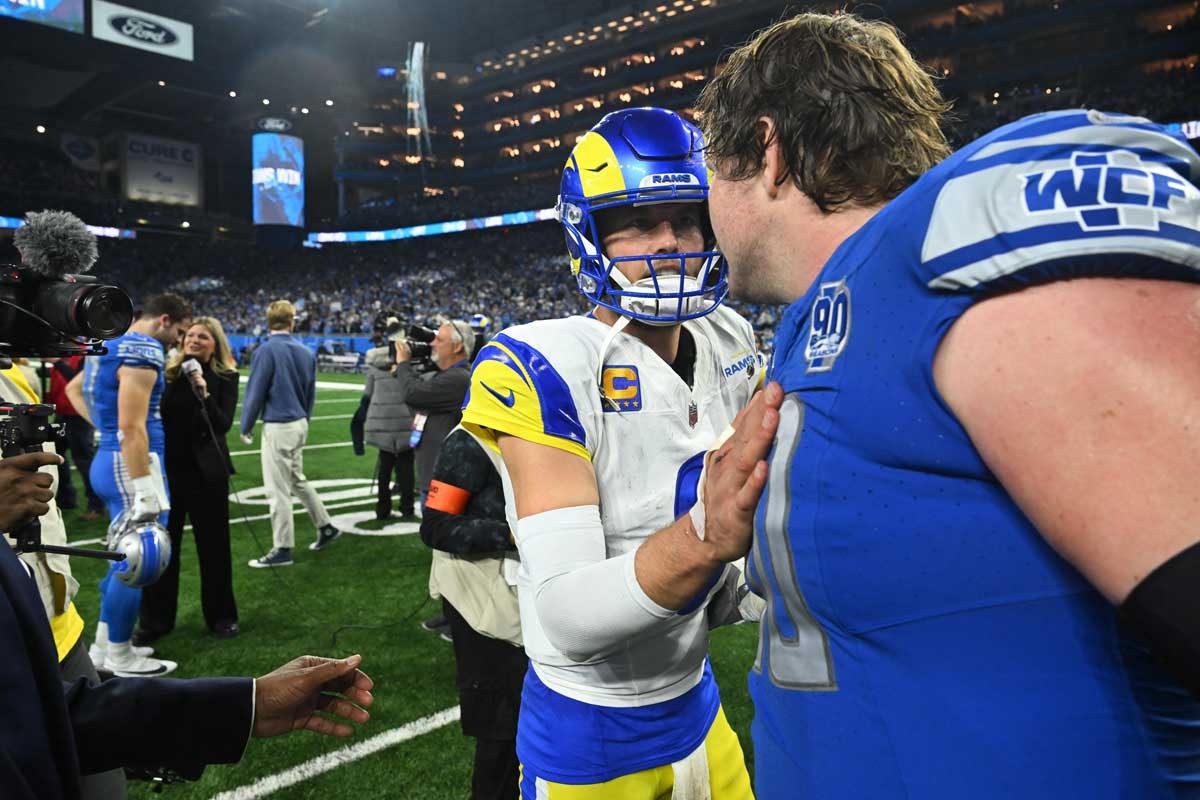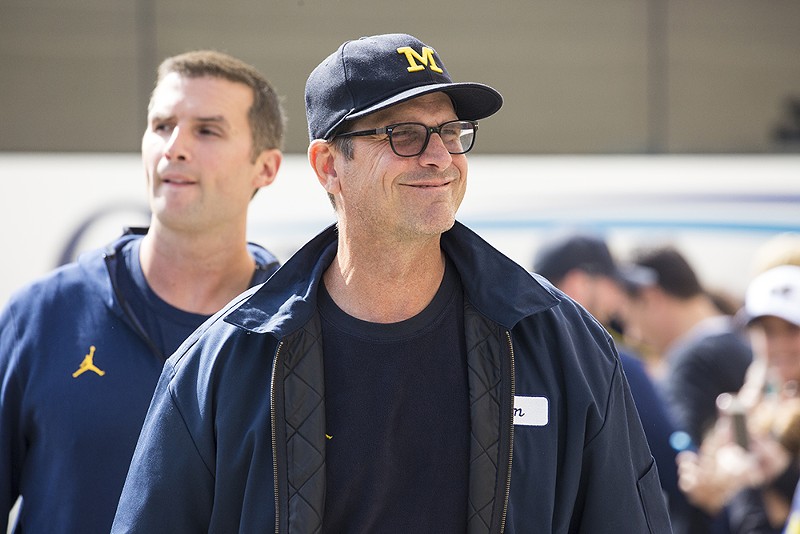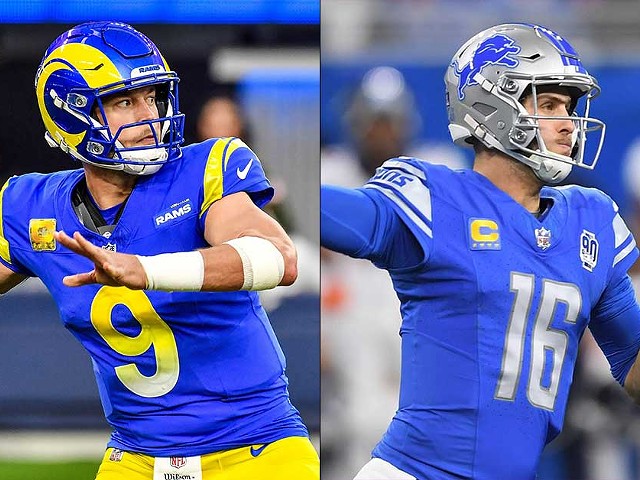Matthew Stafford was a battered Ram and a marked man.
Early in Sunday night’s Lions’ 24-23 victory at raucous Ford Field, the NBC television camera zoomed into a closeup of Stafford’s bloodied, bandaged right hand, the throwing hand for the Los Angeles quarterback who used to play the same role in Detroit.
He’d accidentally gashed his knuckles on a Lion’s helmet on a follow-through after a pass. Later, a camera showed him laughing with the lineman about the wound.
After he threw a different pass, the replay cameras showed two Lions’ defenders crashing into Stafford, one of them meeting him helmet-to-helmet. Then Stafford’s own helmeted head bounced off the turf, sending him to the sideline medical tent for observation.
It was the sort of thing Motor City football fans wanted to see earlier when they booed Stafford and chanted the name of Jared Goff, the Detroit quarterback obtained in a trade to the Rams for Stafford three seasons ago.
As medics checked Stafford, his backup got loose on the sideline. But back came Stafford, game for more game. And, despite all the noise inside the stadium and the pounding from his former teammates, Stafford played the starring role in a losing effort.
He completed 25 of 36 passes for 367 yards and two touchdowns. Despite early domination by Detroit, Stafford kept bringing his team back and showing why he stayed around Detroit for 12 seasons and won a Super Bowl in L.A. in his first of three seasons.
In a post-game interview on Fox 2, Lions’ center Frank Ragnow reflected on why Goff and the Lions needed a final completion for a first down in the final minutes to keep the ball out of Stafford’s hands for a final drive. Stafford used to pull them off to win close ones for the Lions.
“He’s had a lot of those comebacks, we knew that we had to finish out,” Ragnow said of his former teammate. “I’ve just got to say this about No. 9: He’s one of the best. He’s one of the classiest dudes of all time. One of my favorite teammates.”
Stafford’s return to Detroit was the best angle for the national audience, and NBC played it up early and often and wisely stuck with it. The cameras showed him with his four daughters on the field before the game with his wife, their mother.
At the opening of the pre-game show, NBC used a tracking camera to trail Stafford onto the field for his warmups. On the audio, you could hear the fans roaring their disapproval and chanting the name of Goff.
Later, when Stafford took the field for the first play of the L.A. offense, they used the same camera and audio techniques to trail him again, to the same effect.
However, in between came a timing error that must have frustrated the production truck.
With Stafford about to lead his team onto the field, the camera trained on him for 53 seconds. Just as he started to run to the boos of the crowd, the crew switched to a string of commercials and missed the moment. Somebody missed a cue.
Once play began, color analyst Cris Collinsworth noted that the Rams struggled early and seemed to be “moonwalking,” that is to say, walking backward.
Wouldn’t you know it, a few minutes later, Stafford dropped back to pass — stepped backward three steps — and tripped over the turf. He fell on his rear end. An omen? No way.
Even the boo-birds had to admit to his grit. After the game, the cameras showed Stafford embracing several former Lions’ teammates as well as Goff.
For both the local spectators and the national audience, this one was a gem. Stafford had led his team into a hostile road barn and almost pulled off an upset, losing by one point. Call this show a win-win. Next week it’s either the Eagles or the Bucs back downtown. Football in January. Interesting.
@metrotimes #detroit #detroitlions #losangelesrams #nfl #fordfield #football #lionsvsrams #larvsdet #nflplayoffs #goffvsstafford #detroitvseverybody ♬ original sound - Detroit Metro Times
Streaming TV and NFL greed
Sports television crossed a murky Rubicon Saturday night when a playoff game in the National Football League appeared exclusively on the streaming service Peacock, owned by NBC. It was a “Wild Card” game, and that card was a Joker that brought confusion and widespread technical trouble.
The game — between the Super Bowl champion Kansas City Chiefs and the Miami Dolphins — was the first post-season playoff telecast in the four major professional sports to be sold this way in the United States.
The Chiefs won, 26-7, and will move on next weekend to the second round of the four-round Super Bowl tournament. NBC and the NFL probably won, too, while some customers shelled out money they never before had to spend for grief they never before experienced.
They’d better get used to it. Although some saw perfect telecasts Saturday night, others in many parts of the country saw a glitch-filled transmission. The Peacock picture stream often froze, rebooted, turned blurry, or lost sync between sight and sound while lagging several minutes behind play in real time.
Imagine the frustration of the TV-bound gambling addicts who couldn’t bet their “in-game parlays” when their dopamine cravings demanded them. Even non-gamblers had to be aggravated and annoyed at a substandard product at a premium price.
Chiefs’ defensive end Charles Omenihu was so disturbed by the greed of the NFL, that he bought and gave away 90 gift subscriptions to Peacock so blacked-out fans could see the game.
“Us playing on Peacock ONLY is insane,” he wrote on social media. “I won’t lie.” At the time he said it, he didn’t realize how “insane” it might become as customers around the nation tried with mixed results to tune it in on their televisions, their lap-tops, their iPads, and their smartphones.
According to Forbes, NBC paid $110 million for the right to inflict this one game on these terms. The lowest bargain price offered for the telecast was $5.99. The league fertilized the soil over the last couple years with Thursday night games streamed on Amazon Prime.
You have to wonder what those TV and NFL executives have next up their cuff-linked sleeves, what with the NFL reportedly interested in buying an equity stake in ESPN, presumably to vertically integrate their service and possibly pave the way for pay-per-view.
And if you’ve already bought into the shell game of streaming sports, you’ve probably found that some streams are hard to locate and that they are cumbersome to use when trying to channel surf. Customers in Detroit denounce the quality of the app for the local Bally Sports Detroit.
This marketing trend in sports TV has snuck up over the last few years. For instance: A financially troubled local provider like Bally has seen some of its product — Tigers, Red Wings, Pistons — leak over to national cable outlets and, sometimes, to extra-cost streaming channels.
That makes this era one of a major paradigm shift, an inflection point, and a potential fumble by leagues like the NFL. In the past, when customers got socked with increased fees to TV providers, they got more than they were used to getting.
Think of national cable channels like ESPN in the 1980s and local services like ON TV, then PASS, then Fox Sports Detroit and, now, Bally.
Gradually, in a stealthy way, programmers are taking away something viewers used to see as a matter of course and charging you more for it. At least the NFL was smart enough to allow free, over-the-air telecasts of Peacock coverage in K.C. and Miami.
But fans of those teams elsewhere were out of luck without the streaming service. That’s why Omenihu bought those gift subscriptions. Imagine if NBC and the NFL had tried this stunt with the Lions against the Rams.
With so many former Michiganders having scattered through migration all over the American map in the last half-century, the backlash would’ve been even angrier. As for the bigger picture: Is the NFL move to streaming a far-sighted or short-sighted vision?
Remember, this league once insisted on blacking out telecasts of home games in the home market even if they were sold out far in advance. That included the Lions’ 1957 NFL championship victory over the Cleveland Browns in Detroit’s Briggs Stadium.
But they also pioneered the socialist concept of shared national media revenues, a formula that raised pro football to the exalted status it enjoys today.
Despite the NFL’s occasionally unenlightened moments in TV policy, this sports business-entertainment juggernaut remains exceedingly profitable. For the moment, at least, that goose is still laying those golden eggs.
Harbaugh’s champions suit a shifty and shifting era
By winning the national college football championship with a victory over Washington in Houston last Monday, Jim Harbaugh’s University of Michigan Wolverines left objective football fans with mixed feelings, as expressed by ESPN’s Chris Fowler.
“There are people out there that believe that whatever Michigan does is tainted,” Fowler said toward the end of the telecast. “That’s up for you to decide. But, hail, hail, Michigan, they are champions of college football, 2023.”
Fowler referred here to the two suspensions of head coach Harbaugh this season as investigations continued for various infractions of the rules of both the Big Ten and the National Collegiate Athletic Association regarding both recruiting and scouting.
Further discipline of Harbaugh is possible, assuming he doesn’t hustle this success into another job in the NFL. Several of his staff aides left this season under investigative clouds. This may be Michigan’s most talented-but-tainted sports team since the “Fab Five” basketball scandal of the 1990s.
And, perhaps this is the appropriate football year for Michigan to win it all, an era in which professionalism and cynicism have streamed into the college sport at unprecedented levels. Players change teams like free agents, just like their coaches.
Conferences break up and merge, just like the pro leagues. How soon before they, too, stream pay-per-view telecasts? Next year, Michigan will be defending champions of what amounts to the Big Eighteen. Their 15-0 season was almost as long as an NFL schedule. Hail, yes.
Mixed feelings about a great sport
So how much bigger can football get? Is it now at its peak and headed for a long but steady decline?
Curiously, during college championship week, the Washington Post published a long piece headlined “Even in Michigan, the land of Go Blue, tackle football is slipping.”
Regarding football participation, the report stated: “Michigan’s drop of 13 percent, adjusted for public high school enrollment, is larger than that of the nation as a whole (10 percent). Experts blame the downward trend on safety concerns because of the game’s link to brain damage” as well as other factors.
In Michigan, those factors could include an aging population. Another reason nationwide is the rising popularity of soccer. This global sport probably will never overtake football in popularity in the U.S. But it is making strides, decade by decade, as a safer alternative for kids.
Like most football viewers, I cringe when players suffer injuries and writhe in pain on the field. But I never turn off my television. Although often brutal, football also is intelligent, complex, and, at times, a marvelous spectacle to behold.
In print media, I’ve covered several beats of major football teams, including the Chicago Bears of 1977, the Michigan Wolverines of the early 1980s, and the New York Giants of the late 2000s. No team sport demands more risk and devotion from its participants.
I admired the players I wrote about while I feared for them. But I acknowledge that football’s inherent pain and violence is something many find appealing and peculiarly American. And the sport has its heartland defenders, like one famous author, who saw football as vital to the human spirit.
“It makes one exceedingly weary to hear people object to football because it is brutal,” the famous author wrote. “Of course it is brutal. So is Homer brutal, and Tolstoi.”
The author also called football “one of the few survivals of the heroic . . . there must always be a little of the barbarian lurking . . . when the last trace of that vital spark, that exultation of physical powers . . . that fury of animal courage dies out of the race, then providence will be done with us.’”
The author was Willa Cather, who wrote these words in the 1890s while still a student at the University of Nebraska. This was before President Theodore Roosevelt called a meeting of college football leaders in the White House in 1905 to crack down on the brutality of the game. This was before the NFL existed.
Cather’s philosophical — and debatable — observations on football appear in an edition of her masterpiece My Antonia, a novel originally published in 1918. They are included in an introduction written by Stephanie Vaughn of the Department of English at Cornell published in 1994.
Subscribe to Metro Times newsletters.
Follow us: Google News | NewsBreak | Reddit | Instagram | Facebook | Twitter








